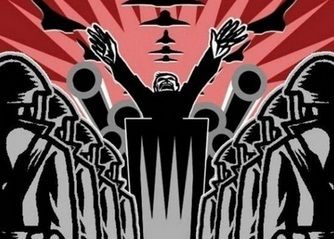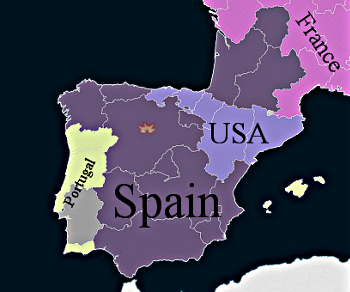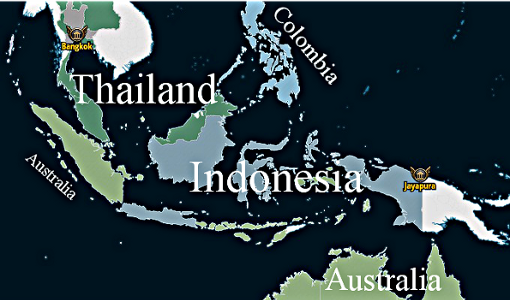Around the world - day 2865
 •
by
•
by TheJuliusCaesar

Much water seems to have flowed under the bridge of Bifröst since I wrote my latest ‘Around the world’ article back in June 2014. For long I have coveted to continue writing (almost) weekly articles, but unfortunately an extremely busy mixture of real life studies and other needs has so far prevented it suspiciously efficiently. As it happens, an eWorldwide journalist competition offered a miraculous chance and motivation to finally find time for writing and, ultimately, to proceed with the intention of continuing the series. So here we are, I hope you enjoy reading this as much as I did writing it.

Pacifican business
Mid-September has marked an extremely busy schedule for the alliance consisting of the powerhouse USA alongside with Russia, Finland, Latvia, Taiwan and Colombia. After a relative calm on all fronts, Finland faced an ‘internal’ military coup while USA prepared themselves for the reinstallation of the defensive dictatorship and for the annual 9/11 airstrike by Thailand. Finnish coup d'état is referred as ‘internal’ because the citizen conducting the act is of Finnish nationality, but that in no way means he was supported internally. The citizen behind all this, Tse Kim, has been somewhat excluded from the national community for years, leading to the fact he was supported almost solely by foreign mercenaries funded by Kim’s excessive pack-sales. Nevertheless, The Finnish Revolution succeeded rather easily on the morning of 13th September, on eDay 2854 of the new world.

Tentatively the revolution mentioned above was not supposed to take place before the 15th due the 9/11-airstrike to the United States which, in the end, never came. Shortly after The Finnish Revolution, the Americans conducted their aforementioned reinstallation of the defensive dictatorship. On eDay 2856, 15th of September, The US joined France and Colombia in their war against Spain, who currently faces invasion from two fronts simultaneously.
To wander off a bit, the development of the war in question was somewhat uncommon: after Spanish natural enemy law on France was proposed, Paris countered the proposal with their own, matching proposal. What makes it curious is that the Spanish law got rejected due to the Madrid’s dictator, Lord Doel, failing to vote on the proposal he himself initiated, while the French counterpart was approved with clear majority. Just a few days later Spain declared another Pacifica member, Colombia, as a natural enemy, who in turn had declared Spain as a natural enemy two weeks prior. Colombian-Spanish war, however, was closed as the Colombians were expelled from the Iberian Peninsula on eDay 2859, 18th September. After the expulsion Spain initiated a second natural enemy law against France in two weeks - again in vain as Lord Doel did not vote this time either. At the time of publishing, Spain occupies the French regions of Aquitaine, Midi-Pyrenees and Limousin, while the US has landed successfully to the Spanish regions of Catalonia, Navarra, Basque Country, Cantabria and Aragon. The News of the People is keeping a keen eye on the development in Iberian Peninsula.

The situation at the time of publishing.

As the most recent development in alliance politics, Portugal has been welcomed to join Asteria, raising the number of member nations to seven and making the home of multiple worldwide powerhouses the biggest alliance in existence.
Also in brief news, the Greek congressmen mistakenly approved a mutual protection pact with France, leading to an article published in French media by the Greek president. In his article, myrmid0nas states that Greece will treat the aforementioned MPP as an aggression against their nation and that the Greek forces will counter the received French MPP-damage by tanking for the French enemies. As France doesn’t have wars ongoing save for the Spanish conflict described above, it seems somewhat obvious what’s going to happen next.

Our second longer story concentrates on the development of Indonesian and Southeastern Asian situation in overall - through the recent internal conflicts on the island nation.
Civil war in Southeast
Former Asian powerhouse Indonesia fell into chaos as a civil war erupted on the island nation on eDay 2861, September 20th. The background of this conflict, again ‘internal’ as civil wars tend to be, lies in the alleged inactivity and incompetence of the current country president Panca. In a politically fragmented nation an impeach is not always a valid option to proceed with. That’s why Karbodanas, who in fact isn’t a native Indonesian, started a coup d’état against the sitting president Panca and published an article outlining the reasons for his actions. He also refers himself but as a mere ‘figurehead’ for an unidentified senior Indonesian player. But why is Karbodanas mentioning the Australian war and how has it anything to do with the civil war?

The story goes all the way back to the times when Indonesia was a dominant powerhouse sowing terror in Southeastern Asia and beyond. Indonesia has always had somewhat rocky relations with its southern neighbor Australia: back in the time Indonesia ruthlessly occupied the Aussies continuously without giving Australia even a slightest hope of achieving congress. Later, when the tables had thoroughly turned and Australia conquered the whole Indonesia, the Aussies however decided to release some of the Indonesian regions as a gesture of affability. For the start of his September term, the president of Australia, Rusty D, offered his Indonesian colleague a deal the Jakartan government had never presented to their Canberran equivalent; a deal in which Indonesia was promised to get all but two of their core regions back. Panca, however refused the deal. For further (yet brief) reading about the history of Indo-Australian relations, I highly recommend to read Rusty D’s article published few weeks ago.
Despite the reluctance of the Indonesian president to cooperate with Australia, who currently has an upper hand, Rusty D set CO’s to help the democratic fighters against the organizers of the previous coup d’état Indonesia faced. This time he refused to take a stance personally and nationally. Strangely enough, Australia nowadays finds themselves on the same side of trenches with Macedonians when it comes to the Indonesian civil wars. As a traditional and strong ally of Jakarta, Macedonia (FYROM) supports the democratically elected government in Indonesia. Certain players, however, have raised doubts about the sincerity of Skopje’s intentions: accusations have been presented that Macedonians are taking advantage of the inexperienced country president Panca by pressuring him in order for Skopje to gain a foothold in the Southeastern Asia and to steer the course of Indonesia towards the interests of Macedonia (FYROM).

The civil war ended in the triumph of democracy, while Philippines were simultaneously waging war against Indonesia, in part as a bottled-up revenge and payback for the wipes of Indonesian empire-era. Philippine-Indonesian war has, however, came to an abrupt end as the Pacific alliance member Colombia has agreed with Philippines to create a buffer-zone around the last Philippine core region for now. The News of the People follows the development keenly.

A relative calm has taken over the world. As regional non-aggression pacts are active in South America, Southern Balkans, between the United States and Asteria alliance and between Croatia & Serbia, multiple nations affected by the pacts are now searching targets abroad if they already haven’t done so. Macedonia (FYROM) has recently conducted an airstrike to Nigeria (and is currently under attack by Brazil, a member of the Asteria alliance), while Bulgaria and Croatia have already established a firm base in India and Pakistan earlier. The Indians have been continuously under foreign invasion for years, in addition for the Balkanian nations, they have hosted at least Canadian forces at certain point.
Middle-East, especially Arabian peninsula, has traditionally been a sandbox and a playground for Balkan nations to play their games and harvest bonuses. At the moment parts of Saudi-Arabia are under Greek (and Cypriot) occupation while Serbia is present in the United Arab Emirates alongside with Japan.


I guess that’s all folks. See you again next week, I hope
Helsinki, 24th September,
- Caesar



Comments
lukematta paskaa
Sulta saa aina rehellisimmän mielipiteen, kiitos
Luettu ja ihan ok.
Aivan mahtavaa!
Piti tulla vielä endorssaamaankin.
Excellent article. Thank you!
Good job 😃
good article
Upea katsaus eMaailman sotatilanteeseen!
Sub 237
v
kraak!
Miksi kirjoitat englantia Suomen mediassa? Yritätkö vaivihkaa amerikkalaistaa Suomen?
Koska kirjoituskilpailuun täytyi kirjoittaa englanniksi.
En ees huomaanu, katoin vaan kuvat.
Excellent!
Good read, I will ensure to shout it in the feeds. Also good luck with the Jurno comp
Much appreciated o/
Awesome stuff my friend!
Missed it for a while! 😛
Well if this was RL I would have sent you on court for defamation!
Macedonia and Indonesia are best allies and everyone who threatens Indonesia will have Macedonia on it's back.
Anyway, I guess this article is for the " Journalist of the week" so good luck...
Nah, I didn't say it myself. Just told some people are saying such things.
But thanks for the feedback 🙂
I'm a filthy uncultured Nglysh mane.
I don't want to guugl it.
Wat is Bifröst?
The rainbow bridge connecting Midgard to Asgard. So fab.
voted
Rusty D wrote 9 minutes ago
TheJuliusCaesar wrote 3 minutes ago
Around the world - day 2865
http://www.erepublik.com/en/article/2553110/1/20
Blackjack and hookers for everyone
No hookers, no vote!
.. Who finishes reading the wall of text 😉
I support that article for "Journalist of the Week" contest!
Well done!
Tämä on paras mahdollinen esimerkki laatujournalismista. 'Nuff said.
Tätä on pakko kompata.
Helposti jaksoi lukea loppuun asti, vaikka on univajetta ja kouluhommat kaatumassa niskaan ja tekstiäkin paljon.
Nom nom, vaihteeksi jotain asiaakin mediassa.
Katsoin vain kuvat
voted
Good, i love to read this 🙂
we indonesians never think that our enemy from the south has the same side like our macedonians brother. when someone invade ur home and then offering u a beer from ur own refrigerator, is that a good gesture? what really happen now is we have no competence government and they taking huge advantage of it while saying to the whole world, "we just wanna help indo by occupying them". sadly, even some of our allies and brothers fall for it which is understandable due to the lack of our government competency.
Well you will be surprised later today then wont you. Things are happening with Indonesia, good things, from this evil country from the South.
These things are happening not because of your current government or allies, but old friends, senior ex-Indo players and senior players all talking and discussing the issues at hand.
You have known me for a long time si petung, and you should trust me when I say that I do want the best for Indo, however somethings take time, as I have to answer to many players in congress and elsewhere
yeah.. i heard whispers something good gonna happen next month. the fact is i trusted u guys once and u broke it. not like me, some of my friends still have lil trust to u guys and trying to work it out. but for now everytime i heard their progress i replied, 'i told u so'. 🙂
less then a month... the first bit will be very soon (if you guys do your part), Later tonight their will be an Aussie CP paper, but Bayern is playing and that is more important then eRep.
Si Petung...
http://www.erepublik.com/en/article/cp-new-flash-aust-to-release-sumatra-2553407/1/20
Thanks for the feedback!
The point of the text was to illustrate the strangeness of Macedonians and Australians both being (mostly) for the Indonesian democracy. I tried to not portray them as an allies for each other, as they are not allies but rather enemies.
Glad to hear the thoughts of an Indonesian citizen regarding the matter. Thanks!
its a good article, looking forward for ur next issue. btw, my friend republish part of ur article in indonesia. http://www.erepublik.com/en/article/2553347/1/20
Thanks. Yes, he messaged me about it and I have no problem. Nice that someone likes 😛
great article and gratz on winning!
Second place anyway 😛 thanks!